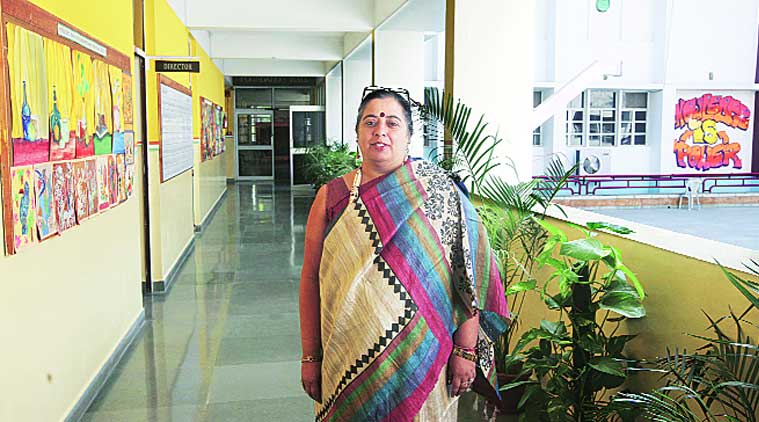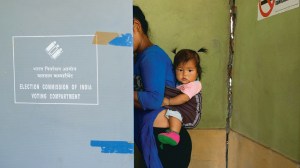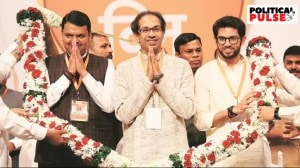- India
- International
Quest: ‘It is important to teach children life skills’
Every academic year begins with an interesting activity, where students are asked to do a ‘SWOT’ analysis of themselves.
 Tania Joshi feels if learning is made fun, then discipline is inevitably achieved.
Tania Joshi feels if learning is made fun, then discipline is inevitably achieved.
What’s your leadership style?
I feel good leadership is one where there is agility to quickly and effectively respond to the requirements of rapidly changing situations. There are times when you need to take firm decisions and other times when one may need to involve teachers and parents to arrive at important policy decisions. So, really, the style is one which is sometimes democratic, at other times situational, sympathetic and at yet other times, collaborative.
How do you handle student discipline?
Student discipline is of utmost importance to me. Rules must be clearly communicated, as must the consequences of undesirable behaviour to all students and parents. I am firm yet friendly with my students. They know that they can trust me and I am always there for them. I strongly believe that in a classroom situation if learning is made “fun”, then discipline is inevitably achieved.
How do you work with diverse students and families?
The first step in working with diverse students and families is to accept the differences. It is vital to make every child feel wanted. It is important to get to know every child and the family.
At our school, every academic year begins with an exercise called ‘Self-discovery’. The youngest children attempt to draw and the older ones attempt to write about themselves. A heterogeneous classroom is here to stay, so it is best the teachers are adequately trained to take up the challenge of reaching out to the diverse sections.
What is the most important quality a principal should have? Why?
A principal should lead by example. She or he must be approachable, dynamic and have a vision for the institution. A principal need not readily have all the answers, but a principal who is constantly growing and learning is likely to be a strong principal. I like to offer opportunities to my staff to continuously elevate themselves, thereby bringing out the best in themselves as well as in the children they handle.

Tell us about your present as well as past assignments and your experience with education system. Also, share your experience as a teacher as well as a school administrator.
I began as a journalist with The Statesman, Delhi. Then I worked at The Centre for Science and Environment as editor, Green File. To balance my personal life with my professional one, I did a BEd and entered the teaching profession, and it didn’t take long for this choice to turn into passion! My career in education now spans close to 22 years. I worked at Gyan Bharati School as PGT Political Science for 14 years.
At present, I am the proud principal of The Indian School. I have always been a proactive teacher and kept the interest of my students at the forefront of my focus. I have also laid strong emphasis on the personality development of the children in my care.
As a teacher, I have learnt that if one establishes a personal rapport with one’s students and makes the subject interesting, the children will inevitably do well. As an administrator, what works for me is the ability to be patient without compromising discipline. In fact, a tactful mix of freedom and firmness works well.
Tell us about your school, its history and motive behind its establishment?
Founded in 1996 by Gyan Mandir Society in the heart of South Delhi, The Indian School prepares students for the Central Board of Secondary Education. The vision of the school is to bring forth children who discover themselves and are trained to pursue their inclinations; both for themselves and equally for the community in which they belong.
Our school’s motto is ‘Knowledge Is Power’ and as we go along, value-learning is instilled by what we call the sanskara syllabus. As our chairman Prafull Goradia says, we believe in ‘building ocean liners with Indian anchors and ethical rudders’.
What are the challenges students generally face these days?
Some of the worrisome issues children commonly struggle with are substance abuse, academic pressure, peer pressure, stress, relationship troubles, physical changes of adolescence and bullying (the most prominent of them being cyber-bullying).
However, I would say here that one major issue which, if addressed, can, to a great extent, contain the other issues. This is, teaching the children life skills. Life skills offer the ability to cope with emotions, decision-making, self-awareness etc, that arm the children to deal with diverse life situations. The students need to be trained to develop their emotional quotient rather than just giving weight to the intelligence quotient.
How do you promote or balance extracurricular activities along with academics in your school?
We give equal importance to both scholastic and co-scholastic activities. Students are continuously encouraged to take part in all co-curricular activities offered. Not only does this strengthen the personality but also greatly enhances the chances of admission to the best colleges.
In fact, every academic year begins with an interesting activity where students are ushered to arrive at a SWOT analysis of themselves.
Willy-nilly, with each passing year, they get to identify their likes and aptitudes better and better. Four periods, every 1st and 3rd Saturday, are reserved for co-curricular activities. Here clubs offer them a chance to choose the activity of their choice. We hold special assemblies, literary activities, exhibitions, inter-school competitions and sports and annual days. This greatly helps students acquire stretched horizons.
Our Summer Internship Programme for senior students also offers children the opportunity to step out of the classroom and take a taste of a ‘hands-on experience’ at an industry, NGO, publishing house, hospital etc.
How is the learning mode in your school — digital classroom or inter-personal?
We lay emphasis on the theory of Multiple Intelligence. We believe that an interplay of distinct and diverse abilities and skills train young learners to examine and apply themselves effectively to problem-solving. We use a methodology that encompasses all kinds of learning modes, the digital classroom and library, inter-personal, intra-personal, presentations, excursions, experiential learning, the buddy system, circle time, etc. We have now started experimenting with the concept of the flipped classroom.
What do you think is your school’s contribution to education in Delhi?
Our school is a forerunner in education. We practise innovations in pedagogy as an integral part of attempting to improve our own knowhow. We also believe in sharing our intellectual and creative capital with other schools. Our first initiative, Malhaar, an inter-school music and dance competition, provides a pulsating platform. Our Dr Amidas Goradia National Inter-school Debate in English and Hindi has now gone beyond the borders of Delhi and NCR to include the participation of schools from across India. We sponsored the ‘Girton College, University of Cambridge and The Indian School Essay Competition’ some years ago.
Now the Foundation School (sister school of The Indian School), operating as a day school under the same society and on the same premises, is a reality. Its mid-morning start has found popularity amongst working professionals in nuclear families. We actively train our children not just to develop as strong individuals but also to make time for returning to the community, as it were, some of what they take. Our Citizenship Programme and Shramdaan Daan project effectively achieve just this.
How important is the role of teachers as mentors or facilitators in the modern learning scheme?
As can be seen, the function of the teacher as a leader (often ‘omnipotent’) is being replaced by a new role as a companion, facilitator and a partner in the acquisition of knowledge. Ideally, teachers should be able to motivate, even from a distance. They should act as observers and not expect set answers from their students. One of the main tasks of a teacher is to create a positive atmosphere for learning in which students are provided with guidance in developing their own individual methods of study. Teachers, in this context, are about placing the emotional, physical, psychological and intellectual traits of their students in harmony with each other. They are managers and organisers, or tutors and mentors, but not ‘walking encyclopedias’, who know only one correct solution to the given task.
How can you contribute to the development of the children in school?
To reinforce the academic curriculum and instill a global vision, a series of talks and workshops are regularly held throughout the year. We invite eminent personalities from all walks of life to interact with our children so that they imbibe a wide world-view. Our students are exposed to personalities like Sir Mark Tully and Patrick French, Valson Thampu, Prof P C Jain, Meenakshi Gopinath, Belinda Wright, William Bissell, Shyam Divan and Madhavi Goradia-Divan. These invaluable interactions help to stimulate the minds of the students and show them first-hand a palette of possibilities they can pursue. It is important to provide an environment at school which builds a conviction in each child to consider the path best- suited to him or her. No matter if it means a road less travelled.
What is your vision for parent participation in the school?
We share a very effective and happy relationship with our parents. In fact right at the start, at the pre-primary and primary levels, parents are involved with our ‘Star-of-the-Day’ and ‘Read-Aloud’ programmes.
At the other end of the spectrum, Class X and XI parents help with summer internships. Parents are also involved with our special evening excursions, where they are encouraged to accompany the teachers and the children to early evening cultural and literary programmes in the city.
Apr 20: Latest News
- 01
- 02
- 03
- 04
- 05





























